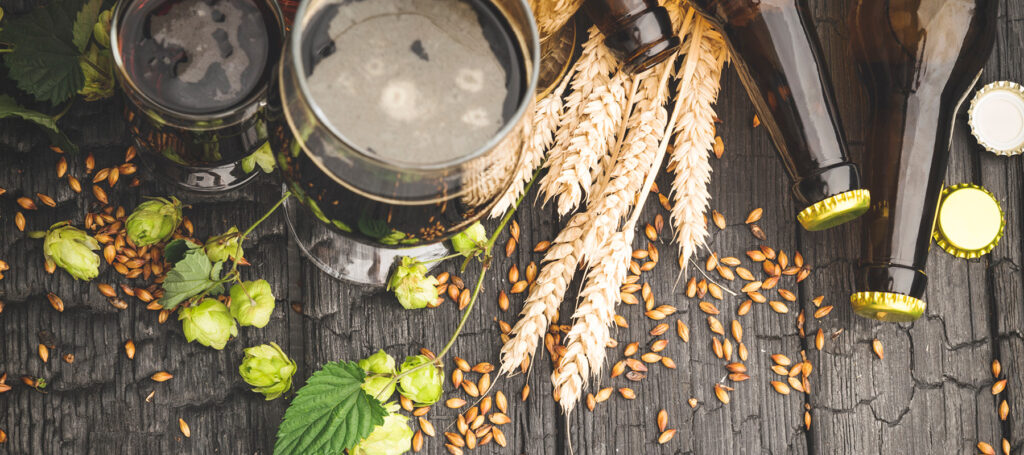
Beer is made from four key ingredients, while there can be other additions to alter flavours or increase shelf live in commercial products, home brewers need only mainly concern themselves really with the big four which we will cover below.
Malt:
Malt is the foundation of all beers. It is simply the a germinated grain that has been dried in a process called malting. There are a number of different grains that brewers use as malt, from barley which is the predominate one, through to wheat and rye.
Malt provides the sugars that are fermented in the brewing process. Depending on the variety ad amount, it also contributes different flavours to the final product and to the colour of the beer when it is ready to drink.
Home brewers generally purchase malt in small amounts to either already milled or unmilled, for their batches or as a liquid extract, where the malt has had the sugars extracted and is ready to use by adding yeast and water.

Hops:
Hops are a flower of the hop plant of which there are numerous varieties which can be used for brewing. Their purpose is to add bitterness to the flavour of the beer as well as a stabilizing agent, as they can act as an anti-bacterial agent. Depending on the variety of the hops, they can also add other aromas to beer including fruity or citrus flavours.

Originally the hop flowers were used directly by adding them to a brew and this is still quite often the case. However, hop pellets which are produced by many suppliers around the world and now more often used in brewing. These pallets are made from hop flowers with the bitterness and aromatic oils locked away inside. This means, in the correct conditions they can be stored and used for a longer period of time.
The hops are generally added at different stages during the boiling stage of the brewing process. Early additions of hops boil for a longer time and provide much of the bitterness to the taste of the beer. Later hop additions boil for less time, meaning less of the violate compounds are lost, so these additions add more to the aroma of the beer.
They are grown in many regions around the world with numerous varieties available or brewers. The types of hops used by a brewer and the time they are added to a batch can have a remarkable impact of the final beer produced from creating a mildly bittered lager to a very hoppy and aromatic Indian Pale Ale (IPA).
Yeast:
Brewer’s yeast is the micro-organism that turns sugar into alcohol and carbon dioxide, in the process called fermentation. Yeast is a single celled organism and is really a type of fungi with there being over a thousand known varieties. Some yeasts are very useful for baking while others are perfect for brewing.

Brewers yeasts are generally divided into two distinct types being “top” fermenters and the “bottom” fermenters. The top fermenters are called this because the yeast tends to float to the top forming a foam during fermentation. They tend to be used to produce ales and work well at higher temperatures around 180c. Bottom fermenters tend to sink to the base of the fermenter and are more associated with lagers with an optimum temperature around 120c.
Home brewers generally have a choice to purchase their yeast either as a dried yeast in a sealed package or as a liquid slurry. Both types are generally ready to be added or “pitched” into the wort (sugary liquid produced from malt) to start a fermentation.
Water:
The final ingredient of beer and the one quite often overlooked with regards to its importance in brewing, is of course water. It is important that brewing water should be clean and free of any off odours, such as chlorine. Most home brewers have little choice but to use their town water, which is generally fine for home brewing purposes. A good tip can be to leave the brewing water in your mash kettle overnight before brewing to allow any excess chlorine to dissipate.
Good brewing water is generally on the lower side of the pH level, meaning it has a lower alkalinity. This helps with the conversion process of the sugars in the mash, but it can depend on the type of beer you are brewing. Water is need as an ingredient of the beer itself, but is equally important as being part of the cleaning process, rehydrating dried yeast as well as the cooling process of wort in some home brew situations. So you will need a reliable source of clean water for successful home brewing.